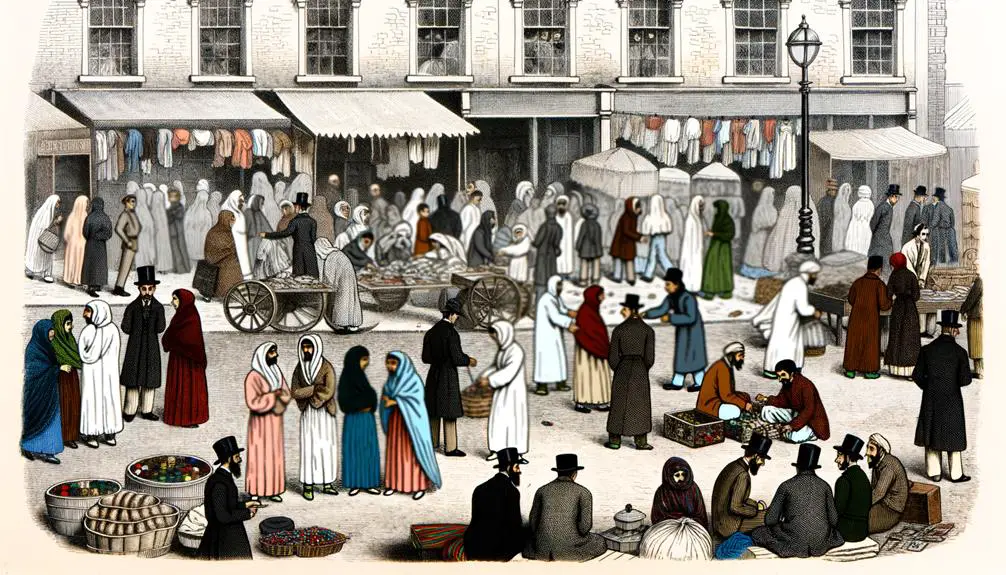In British slang, you'll recognize 'punter' as a term that's journeyed far from its late 18th-century gambling roots. Initially, it specified someone engaged in betting activities within the gambling dens of England. Over time, its application broadened considerably, reflecting a linguistic evolution tied to shifts in British socio-cultural landscapes. Now, it generically denotes customers or users across various service industries, carrying nuanced implications of impersonality in contemporary consumer-provider interactions. This versatility in everyday UK lexicon, combined with regional variations, underscores the term's adaptability and depth. Exploring the full spectrum of 'punter' offers insights into its cultural resonance and linguistic fluidity in modern Britain.
Key Takeaways
- In British slang, 'punter' commonly refers to a customer or user of a service.
- Originally associated with gambling, its use has expanded to everyday vernacular.
- It implies a certain casualness or informality in the consumer-provider relationship.
- Regional variations in the UK may influence the term's connotation and usage.
- Beyond gambling, 'punter' can denote a lack of expertise or specialization in a given context.
The Origins of 'Punter'

One might find it fascinating that the term 'punter', now ubiquitous across various British social contexts, originally stems from the late 18th-century colloquial usage within the gambling dens of England, denoting someone who places a bet. The etymological roots of 'punter' are deeply embedded in the lexicon of British gambling culture, tracing a linguistic evolution that mirrors the socio-cultural shifts within British society. Initially, the term was confined to the gambling environment, signifying an individual engaged in betting activities.
As language tends to evolve with society, the semantic scope of 'punter' expanded beyond its gambling origins. This linguistic evolution is indicative of the term's versatility and adaptability within the English language. The process by which 'punter' transformed from a gambling-specific term to a broader colloquialism reflects the dynamic nature of slang and its capacity to traverse distinct social domains. Analyzing the etymological roots and linguistic evolution of 'punter' offers insights into how words can gain new meanings and integrate into everyday vernacular, shedding light on the complex interplay between language, culture, and social practice.
Common Uses in the UK
Having explored the etymological journey of 'punter' from gambling parlance to broader societal usage, let's now examine how it's commonly employed across various contexts in the UK today. From a punter perspective, this term has undergone significant slang evolution, transforming into a versatile descriptor used in everyday British lexicon. Initially rooted in the gambling domains, 'punter' now transcends its original confines, serving to denote customers or users in a wide array of services and industries.
In the domain of business and commerce, you're often considered a 'punter' when engaging with services, be it dining at a restaurant, attending a concert, or utilizing a taxi service. This usage underscores a transactional relationship, albeit with a nuanced acknowledgment of the ordinary, everyday nature of such interactions. In the creative and entertainment sectors, 'punter' acquires a slightly different connotation, referring to attendees of performances or art exhibitions, highlighting their role as consumers of cultural products.
The slang evolution of 'punter' reflects broader shifts in language and society, encapsulating a distinctly British blend of respect and familiarity towards the consumer or participant. This evolution, deeply embedded in the UK's cultural and linguistic fabric, offers insights into how language adapts to changing societal norms and practices.
Variations Across Regions

You'll find that the term 'punter' exhibits nuanced variations in its use and connotation across the UK, shaped appreciably by regional dialects and socio-linguistic landscapes. In the North versus South dichotomy, not only does the frequency of 'punter's' usage vary, but so does its contextual meaning, reflecting deeper cultural and social divides. City-specific slang variants further complicate its uniform understanding, indicating a rich tapestry of local identities and linguistic evolution within the broader British context.
Regional Slang Differences
The term 'punter,' while universally recognized across the UK as a casual reference to a customer or user of services, exhibits nuanced variations in its connotation and usage among the different regions, reflecting the rich tapestry of British dialects. This diversity is a confirmation to the dialect evolution that has been shaped by historical, social, and economic factors unique to each area. Language globalization, however, introduces a homogenizing force, subtly influencing and sometimes standardizing regional slang. Yet, 'punter' remains a resilient marker of local identity, adapting while retaining its core meaning. Its regional variations offer a fascinating lens through which to examine the interplay between global linguistic trends and the preservation of local dialects, underscoring the dynamic nature of language.
Northern Vs Southern Usage
Exploring the nuanced distinctions in the application of 'punter' between Northern and Southern regions reveals a compelling narrative of linguistic diversity and cultural identity within the UK. The dialect influence is profound, shaping not just the pronunciation but also the context in which 'punter' is employed. In the North, where accents are often perceived as more forthright, 'punter' can carry a tone of camaraderie or informality, reflecting the communal ethos. Conversely, in the South, particularly areas with a perceived posher accent, the term might be wielded with a slight edge of detachment or commercial transactionality. This accent perception plays an important role in the word's connotation, underlining how regional variations in speech contribute to the multifaceted identity of British English.
City-Specific Slang Variants
Diving deeper into the linguistic landscape, we find that city-specific slang variants of 'punter' reveal fascinating insights into regional linguistic identities across the UK. The dialect influence on slang evolution becomes apparent as you explore how different cities adopt and adapt the term to fit local linguistic norms. In Liverpool, for example, 'punter' might carry a slightly different connotation than in London, reflecting the city's unique cultural and social milieu. This variation underscores the dynamic nature of language, where words are not static but evolve in response to shifting societal values and interactions. The study of these city-specific variants not only enriches our understanding of 'punter' but also offers a window into the broader processes of dialect influence and slang evolution within the UK's complex linguistic tapestry.
'Punter' in Sports Betting

In sports betting, a 'punter' refers to an individual who places bets or wagers on the outcome of various sporting events, embodying both the risk-taker's optimism and the strategic thinker's analysis. This term encapsulates a multifaceted role within the gambling ecosystem, wherein the punter's engagement is not merely transactional but deeply intertwined with an understanding of betting strategies and wagering psychology. You, as a punter, navigate through a complex landscape, leveraging statistical data, historical outcomes, and personal intuition to predict the future.
Your approach to betting is markedly influenced by your psychological makeup and the betting strategies you adopt. The selection of a strategy, whether it be following betting trends, understanding the nuances of value betting, or employing a risk-averse approach, delineates your identity within the sports betting community. The psychological aspect, encompassing discipline, emotional control, and decision-making under uncertainty, further defines your success or failure in this domain.
The intersection of betting strategies and wagering psychology shapes the ecosystem of sports betting, with you, the punter, as a pivotal figure. Your decisions, informed by analysis and intuition, contribute to the dynamic nature of sports betting, making it a field ripe for academic inquiry and practical exploration.
Beyond Gambling: Everyday Use
While 'punter' is widely recognized in the context of sports betting, its usage extends into everyday vernacular, reflecting a broader spectrum of meanings that resonate with cultural nuances and social dynamics. The term 'punter' has evolved to describe not just gamblers, but any general consumer or member of the public, particularly in contexts where there's a transactional dynamic at play. This shift in meaning highlights the fluidity of language and its ability to adapt to changing societal landscapes.
Delving deeper, the usage of 'punter' in everyday language encapsulates a variety of punter perspectives, shedding light on the social implications of its application. It's indicative of a casual, perhaps even dismissive attitude towards the consumer role, suggesting a certain level of detachment or anonymity. This linguistic change mirrors societal trends towards depersonalization in consumer relationships, reflecting a broadening gap between service providers and their clientele.
Moreover, the application of 'punter' beyond gambling contexts underscores a collective acknowledgment of the risk inherent in consumer choices, paralleling the gambles taken in betting. The term serves as a linguistic bridge, connecting the dots between differing facets of everyday life and the inherent uncertainties they encompass.
Punter in the Service Industry

The term 'punter,' when applied within the service industry, reveals a nuanced understanding of the consumer-provider dynamic, emphasizing the often impersonal nature of modern transactions. This designation, while seemingly innocuous, carries with it implications about the nature of the interaction: one where the provider views the consumer not as an individual with specific needs and desires but as one of many in a series of commercial exchanges. This perspective is critical to comprehending how service expectations are managed and how customer satisfaction is pursued within this framework.
In the service industry, the concept of the punter is intertwined with the delivery of goods and services where the personalization of the experience may often be secondary to the efficiency and volume of transactions. Here, the aim is to meet predefined standards of service, with the understanding that the punter's primary expectation is the fulfilment of the basic terms of the service agreement. This approach to customer service underscores a transactional relationship, where the depth of personal engagement is often limited. Analyzing this dynamic offers insights into the broader trends in consumer culture, where the value of an exchange is frequently measured more by its adherence to service expectations than by the quality of individualized customer care.
Cultural References and Media
British media's portrayal of the term 'punter' offers a diverse landscape for analysis, revealing how cultural narratives shape and are shaped by societal attitudes towards consumerism. Delving into the domains of music influence, one can observe how the term is often embedded within lyrics and interviews, subtly crafting an archetype of the average consumer or fan within the British cultural landscape. This not only reflects but also perpetuates the notion of the 'punter' as an integral part of the entertainment industry's ecosystem, highlighting their role in sustaining the market through consumption.
Furthermore, celebrity endorsements play a pivotal role in this scenario, serving as a bridge between the consumers ('punters') and the products or experiences being marketed. Through their public identification with certain brands or events, celebrities effectively validate the 'punter's' participation in consumer culture, simultaneously reinforcing the term's association with a willing participant in the commercial exchange. This interplay between music influence and celebrity endorsements encapsulates a complex narrative where the 'punter' is at once the subject and object of media discourse, illustrating the multifaceted influence of media in shaping perceptions of consumer identity within British society.
Understanding Context and Nuance

Grasping the term 'punter' within the UK's cultural milieu necessitates an appreciation of the subtle distinctions and contexts in which it is deployed, revealing layers of meaning that transcend its surface interpretation. You'll find that the evolution of language and the appropriation of slang play pivotal roles in the nuanced understanding of 'punter.' Initially, it might denote simply a customer or user, particularly in the domains of gambling and sports. However, delving deeper, you'll uncover that its connotations extend into areas of casualness and informality, often embodying the everyday person or layman.
The appropriation of slang such as 'punter' signifies a dynamic aspect of cultural identity, reflecting societal shifts and attitudes. You must observe how its usage varies across different social groups and settings to fully appreciate its complexity. In some contexts, it might carry a hint of endearment or camaraderie, while in others, it could imply a lack of expertise or sophistication. This duality underscores the importance of context in interpreting slang.
Understanding 'punter' becomes an exercise in linguistic archaeology, piecing together social cues, historical usage, and contemporary evolution. It's a manifestation of the fluidity of language and the importance of slang in enriching communication, offering a window into the cultural psyche and societal values.







